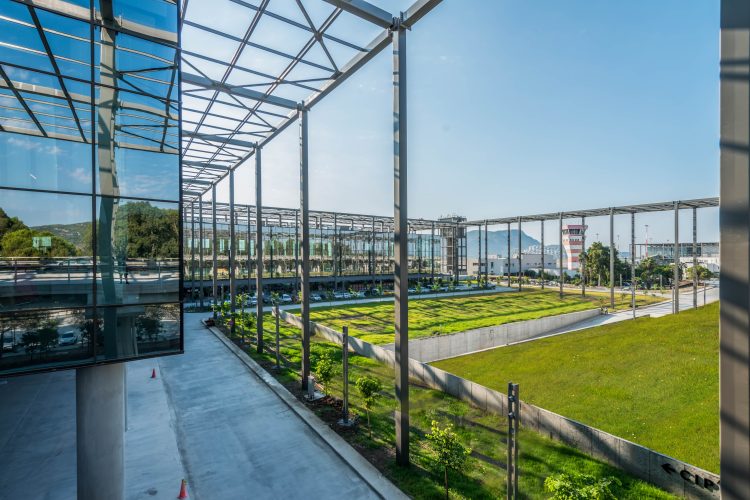What is next for sustainability and airports?
- Like
- Digg
- Del
- Tumblr
- VKontakte
- Buffer
- Love This
- Odnoklassniki
- Meneame
- Blogger
- Amazon
- Yahoo Mail
- Gmail
- AOL
- Newsvine
- HackerNews
- Evernote
- MySpace
- Mail.ru
- Viadeo
- Line
- Comments
- Yummly
- SMS
- Viber
- Telegram
- Subscribe
- Skype
- Facebook Messenger
- Kakao
- LiveJournal
- Yammer
- Edgar
- Fintel
- Mix
- Instapaper
- Copy Link
Posted: 15 September 2023 | Alexandre de Joybert | No comments yet
Alexandre de Joybert, Director of Sustainability at ACI Europe, gave International Airport Review an update in Issue 2 on the Airport Carbon Accreditation programme, it’s progress, and a view of what the industry needs to do next.


CREDIT: ACI EUROPE
At the time of writing, Airport Carbon Accreditation – the only global carbon standard for airports – has just reached a ground-breaking milestone. Over 500 airports across the world are now accredited by the programme, and are addressing their carbon footprint at one of the frameworks’ six levels.
For an initiative that started with only 17 European airports in 2009, this number represents a turning point, a watershed moment in which airports are ramping up the pace of decarbonisation.
Springboard for action
This news is a great point of departure to talk about airport sustainability, and in particular its environmental aspect. Despite the heavy blow the COVID-19 pandemic dealt to the aviation industry, and the subsequent pressures of rising inflation and geopolitical instability, airports have not only stood firm by their climate efforts, but doubled down on this commitment to deliver tangible CO2 reductions.
According to the recently published Airport Carbon Accreditation Annual Report 2021-202211, the global community of accredited airports managed to reduce more than half a million tonnes of CO2 emissions between May 2021 and May 2022. A further 900,000 tonnes was saved from being emitted into the atmosphere thanks to airports’ investments in reliable carbon credits.
Despite recognising that airports are responsible for a comparatively smaller slice of aviation’s emissions, 206 airports worldwide are now certified for serving as platforms for third party reductions. From Level 3 of Airport Carbon Accreditation upwards, airports need to provide evidence of effective partnerships with companies active within their premises with the aim of carbon reductions by business partners across the entire airport site.
Climate action can only be effective if done collectively, considering the capabilities and limitations of each party involved. Conversely, the benefits of an airport coming on board with Airport Carbon Accreditation ripple through to the communities they serve and work with. As the place where all aviation stakeholders meet, airports are the best placed to become springboards for climate action. It’s all about setting that virtuous cycle into motion!
Net zero foundations
It is internationally agreed that the ultimate goal of carbon management is the attainment of net zero emissions across all three scopes as defined by the GHG Protocol – a goal that in the current technological setup isn’t feasible for airports because a large chunk of these emissions fall outside of their control.
While the technology enabling a truly carbon-free flight hasn’t been invented yet, this is not an excuse for airports to compromise on ambitious climate goals. At ACI EUROPE, we also have evidence to the contrary.
The massive recruitment drives, investments in staff skillset and qualifications and salary increases implemented by airports form an integral part of future-proofing the airport business.”
We have started influencing the reductions of all carbon emissions sources by issuing practical guidance to facilitate a reductions of aircraft carbon emissions. We also incentivise more carbon footprint calculations that are supported by effective stakeholder engagement plans.
European airports were the first aviation stakeholders globally to commit to achieving net zero, back in June 20192. The ACI EUROPE resolution, which forms a backbone of that goal, was launched with over 190 airports individually undersigning it.
Four years on, this group has now swelled to 273 airports, and includes the busiest hubs in Europe, with more than 100 airports aiming to deliver on their pledge two decades earlier – by 2030. This accelerated ambition has given impetus for further developments of the Airport Carbon Accreditation framework to encompass a Net Zero Scope 1 and 2 target.
What is at stake is also access to renewable and clean energy, which is needed for zero-emission aircraft to actualise.”
With this constant development and improvement at its core, the programme continues to be the reference point for airports across the globe to take climate action. Our mission and vision, ultimately, is not for the airport operator to become carbon free, but for all companies providing their services at the airport. Only then, can we transition airports to a fully decarbonised airport industry globally.
A means to an end
As much as the environmental aspect of sustainability is a dominant issue in public discourse, the experts working on the topic know that without the two pillars of economy and society, the tower cannot stand.
The economics of the airport business remain fragile, as the ravages of the COVID-19 pandemic are slow to recede. While the world celebrated WHO’s decision to declare the end of COVID-19 as a global health emergency, European regional airports were gathering at the annual ACI EUROPE Regional Airports Conference & Exhibition. Here, they heard from ACI EUROPE Director General that airport debt and liabilities are still €60 billion higher than pre-pandemic.
This financial weakness is because airport charges are not following inflation. Given the fixed nature of this primary source of revenue for airports, even the tiniest change in macro-economic conditions can tip airports over the edge of loss-making, not to mention double-digit inflation markers. In real terms, airport charges stood at -9% in January 2023, compared to that of 2020.
With depleted revenues, the investments in decarbonising infrastructure are harder to realise in the short to medium term. According to a recent study commissioned by the Destination 2050 partners3, at least €18 billion will be needed for European airports to realise the necessary adaptation of their infrastructure to support new aircraft types powered by alternative fuels.
What is at stake is also access to renewable and clean energy, which is needed for zero-emission aircraft to actualise. This alone would need additional billions of euros of investment, if we consider, for instance, the cost of building hydrogen liquefaction facilities at airports.
In this context, policymakers and regulators should be looking at financing airport decarbonisation and business transformation more closely, as this will determine the speed of ridding the industry of carbon.
In a recent study on the economics of aviation decarbonisation4 – looking at the 2030 Green Deal target – EUROCONTROL put forward an important, albeit counterintuitive conclusion. The more we fly, the faster aviation can decarbonise.
It’s simply a matter of economics at scale; increases in passenger numbers will generate a necessary revenue to drive investment in new technology and the renewal of infrastructure. Here again, the notion of a virtuous cycle knocks on our doors. Taking a key decarbonisation opportunity for aviation – Sustainable Aviation Fuels – as example, economics 1-0‑1 kicks into play. We need more demand to trigger investments into the supply chain, which will further boost the uptake of SAF and lower the cost.
As far as airports’ ability to reach net zero is concerned, without the competence to set their own charges in line with green investment needs, we won’t be able to go far.
The industry (AKA the people)
And what of the ‘social’ pillar of sustainability? The importance of the workforce to our operations was brought into focus last summer when aviation suffered acute staff shortages. Airports and their operating partners, short on governmental support to furlough staff over prolonged periods, had to let swathes of personnel go. The ramp up – when it came – had little warning and little guarantee of sticking.
Add to this a tight labour market across Europe, training periods and security checks for new recruits, and airports struggled to service the demand. Whilst not all airports were hit equally, the ‘summer of discontent’ dominated European headlines and disrupted many passenger plans.
Many of these factors were outside our control, but there were also valuable lessons to be learned. In tight labour markets, being an employer of choice really matters. Hand‑in-glove with this goes staff training and retention. The massive recruitment drives, investments in staff skillset and qualifications and salary increases implemented by airports form an integral part of future-proofing the airport business.
Does sustainability need a rebrand?
In recent years, sustainability has become a buzz word – sometimes with negative connotations attached. It’s often misconstrued or used interchangeably with environmental terminology, reducing its scope and complexity. Of course, there is no turning back from the status quo, which sees sustainability as a malleable concept – a catch-all phrase used more often as a prop than a designator of meaningful action.
While collectively we might not be ready to pivot away from using this word, the important effort that organisations need to put in advance are these three pillars concurrently. I would like to sign off with a quote describing one possible avenue forward, from one of the leading experts in airport sustainability.
Christel Vandenhouten, Head of Sustainable Development at Brussels Airport Company and the Chair of the ACI EUROPE Environmental Strategy Committee once said that she will only consider her mission to be accomplished when there won’t be a need for a sustainability department within her organisation. The sustainability-first approach would have merged or trickled down to every single department, guiding every last decision. This might just be the best of futures for sustainability.
References


Alexandre de Joybert joined ACI EUROPE in February 2022 and is responsible for the coordination of all aspects of the association’s sustainability strategy. In this regard, he represents ACI EUROPE in various high-level EU, ECAC and EUROCONTROL fora. He also monitors the administration and ongoing evolution of the global carbon standard, Airport Carbon Accreditation which belongs to ACI EUROPE.
He is a French national with master’s degree in International & European Law (Nanterre & Sorbonne Universities), a Master in Political Sciences (Sciences Po Paris) and an MSc in Political Economy of Europe (London School of Economics).
Before joining ACI EUROPE, he has worked for Total, The Oil & Gas Year, the Brunswick Group and most recently for Plastics Europe – with a focus on energy and sustainability issues.
Issue
Related topics
Airport Carbon Accreditation (ACA), Social responsibility, Sustainability, Sustainable Aviation Fuel (SAF), Sustainable development


















